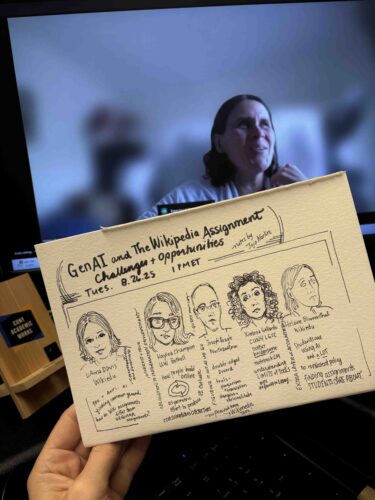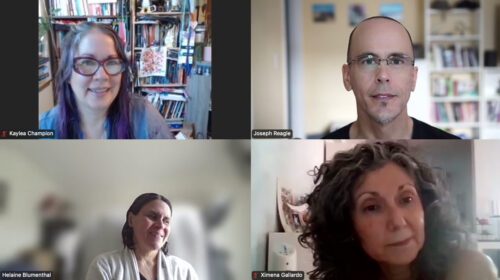There’s little doubt that generative AI chatbots built on large language models are reshaping how students approach research and writing – but what are the implications for high-impact, public-serving coursework like the Wikipedia assignment?
In August, Wiki Education launched the new academic year of our Speaker Series by bringing together a panel of scholars to consider this timely question. Moderated by Chief Programs Officer and Deputy Director LiAnna Davis, the discussion featured insight from panelists Ximena Gallardo (LaGuardia Community College), Kaylea Champion (University of Washington Bothell), Joseph Reagle (Northeastern University), and Helaine Blumenthal (Wiki Education), who explored the intersection of generative AI chatbots, higher education coursework, and Wikipedia.

Champion, a professor of computer science, uses the Wikipedia assignment to teach students about online communities in addition to making contributions to the online encyclopedia. Drawing from her research, she noted that one of the biggest dangers of generative AI is its ability to produce text that appears polished but is actually inaccurate or fabricated – the “plausibility risk.”
“As an instructor, you see text come in that you know was not written by the student,” explained Champion. “You can just sort of feel it, or you have some sense from the references that are fabricated that this is a case where a student has produced material through generative AI.”
In the context of the Wikipedia assignment and beyond, preventing this risk starts with instructors helping students understand how AI text is generated and how to use it appropriately, but also understanding it themselves, Champion explained.
“We [as instructors] have a strong obligation to make sure that it is excellent quality work,” said Champion of student contributions to Wikipedia. “And that our students get a great experience, absolutely, but the general public is counting on us to make sure their information environment is clean.”
Gallardo, who experimented with generative AI for her Wikipedia assignment last spring, echoed Champion’s concerns. A longtime Wikipedia editor herself, she found Google’s Notebook LM helpful in starting her own draft to create a new Wikipedia article. But Gallardo’s students struggled to revise the lengthy, polished-looking texts they received from the tool.
The English professor realized that her effective use of the tool stemmed from the expertise she brought to the interaction – expertise that spans areas where students need more experience, she noted. For students to productively use AI to generate text, Gallardo emphasized that “they have to be experts on Wikipedia, on the subject, on how to use the AI chatbots properly, and let’s not forget, how to write well!”

A longtime Wikipedian and professor of communication studies, Reagle described generative AI as a “double-edged sword.” For students working on Wikipedia assignments, he observed that AI tools might offer practical support when choosing a topic or translating content. But like his fellow panelists, Reagle strongly cautioned against trusting the accuracy of any AI output.
“It’s a tumultuous time, and like a lot of people on the panel, I’m trying to figure it out as I go along,” said Reagle. “My policy for students is ‘query, don’t copy.’”
Amid these challenges, panelists emphasized how the public-facing nature of the Wikipedia assignment itself could act as a safeguard.
“The fact that millions of people could read what you’re adding to Wikipedia has always been a motivating force for our students to do a little better, to take it a little more seriously,” said Blumenthal, who oversees Wiki Education’s Wikipedia Student Program. “A lot of faculty are looking at the Wikipedia assignment for the same reasons, because it has this public-facing nature. There’s this extra layer of accountability, and students are going to be a little more vigilant.”
For faculty open to AI use by students, Wiki Education has introduced a new student training module, “Using Generative AI tools with Wikipedia,” to help participants navigate this new terrain.
Echoing the panel discussion, the module asserts that AI chatbot output should never be copied and pasted into a Wikipedia article. It explores how AI tools can be both harmful and helpful, considers the implications of AI use, suggests ways AI could assist the research process, and offers real-life examples that show why human brains and critical thinking skills are more important now than ever.
The webinar “Gen AI and the Wikipedia Assignment: Challenges and Opportunities” hosted more than 250 attendees from around the world. Like the panelists, many of the attendees also shared links, resources, and ideas throughout the discussion, creating a lively chat box.
Join our next Speaker Series on Monday!
Studying Impact: How does the Wikipedia assignment shape student learning?
Monday, September 15, 2025
12 pm Pacific / 3 pm Eastern
Registration
Interested in incorporating a Wikipedia assignment into your course? Visit teach.wikiedu.org to learn more about the free resources, digital tools, and staff support that Wiki Education offers to postsecondary instructors in the United States and Canada.
